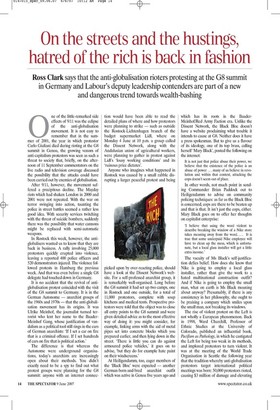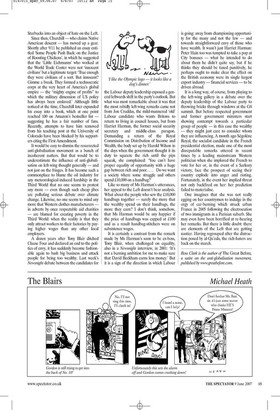On the streets and the hustings, hatred of the rich is back in fashion
Ross Clark says that the anti-g,lobalisation rioters protesting at the G8 summit in Germany and Labour's deputy leadership contenders are part of a new and dangerous trend towards wealth-bashing ne of the little-remarked side effects of 9/11 was the eclipse of the anti-globalisation movement. It is not easy to remember that in the summer of 2001, the year in which protestor Carlo Giuliani died during rioting at the G8 summit in Genoa, the growing venom of anti-capitalism protestors was seen as such a threat to society that, briefly, on the afternoon of 11 September commentators on the live radio and television coverage discussed the possibility that the attacks could have been carried out by enemies of globalisation.
After 9/11, however, the movement suffered a precipitous decline. The Mayday riots which had shaken London in 2000 and 2001 were not repeated. With the war on terror swinging into action, taunting the police in street battles seemed a rather less good idea. With security services twitching with the threat of suicide bombers, suddenly there was the possibility that water cannons might be replaced with semi-automatic weapons.
In Rostock this week, however, the antiglobalisers wanted us to know that they are back in business. A rally involving 25,000 protestors quickly erupted into violence, leaving a reported 400 police officers and 520 demonstrators injured. The violence followed protests in Hamburg the previous week. And that was even before a single G8 delegate had touched down in Germany.
It is no accident that the revival of antiglob alisation protest coincided with the visit of the G8 summit to Germany. It is in the German Autonome — anarchist groups of the 1960s and 1970s — that the anti-globalisation movement has its origins It was Ulrike Meinhof, the journalist turned terrorist who lent her name to the BaaderMeinhof Gang, whose justification of vandalism as a political tool still rings in the ears of German anarchists: 'If I set a car on fire that is a criminal offence. If I set hundreds of cars on fire that is political action.'
The difference is that whereas the Autonome were underground organisations, today's anarchists are increasingly open about their methods. You didn't exactly need to be a spy to find out what protest groups were planning for the G8 summit: anyone with an internet connection would have been able to read the detailed plans of where and how protestors were planning to strike — such as outside the Rostock-Lichtenhagen branch of the budget supermarket Lidl, where on Monday 4 June at 10 p.m. a group called the Dissent Network, along with the Andalusian union of agricultural workers, were planning to gather in protest against Lidl's 'lousy working conditions' and its 'ruinous price dictates'.
Anyone who imagines what happened in Rostock was caused by a small rabble disrupting a larger peaceful protest and being picked upon by over-reacting police, should have a look at the Dissent Network's website. For a self-professed anarchist group, it is remarkably well-organised. Long before the G8 summit it had set up two camps, one in Rostock and one outside, for a total of 11,000 protestors, complete with soup kitchens and medical tents. Prospective protestors were told that the object was to close all entry points to the G8 summit and were given detailed advice as to the most effective way of doing it: you might consider, for example, linking arms with the aid of metal pipes set into concrete blocks which you prepared earlier, and then lying down in the street. 'There is little you can do against armoured police vehicles,' it goes on to advise, 'but they do for example hate paint on their windscreens.'
At Heiligendamm, too, eager members of the 'Black Bloc' were expected — another German-born-and-bred anarchist outfit which was active in Genoa five years ago and which has its roots in the BaaderMeinhof/Red Army Faction era. Unlike the Dissent Network, the Black Bloc doesn't have a website proclaiming what trouble it intends to cause at G8. Neither does it have a press spokesman. But to give us a flavour of its ideology, one of its top brass, calling herself 'Mary Black', posted the following on the internet: It is not just that police abuse their power, we believe that the existence of the police is an abuse of power ... many of us believe in revolution and within that context, attacking the cops doesn't seem out of place.
In other words, not much point in sending Commander Brian Paddock out to Heiligendamm to advise on community policing techniques: as far as the Black Bloc is concerned, cops are there to be beaten up and that is that. It isn't just the cops, either. Mary Black goes on to offer her thoughts on capitalist enterprise: 'I believe that using the word violent to describe breaking the window of a Nike store takes meaning away from the word.... It is true that some underpaid Nike employee will have to clean up the mess, which is unfortunate, but a local glass installer will get a little extra income.'
The vacuity of Ms Black's self-justification defies belief. How does she know that Nike is going to employ a local glass installer, rather than give the work to a hated multinational construction outfit? And if Nike is going to employ the small man, what on earth is Ms Black moaning about anyway? Presumably, if there is any consistency in her philosophy, she ought to be praising a company which smiles upon the small man, not breaking its windows.
The rise of violent protest on the Left is not wholly a European phenomenon. Back in 1998, Ward Churchill, Professor of Ethnic Studies at the University of Colorado, published an influential book, Pacifism as Pathology, in which he castigated the Left for being too weak in its methods, and implored protestors to turn violent. It was at the meeting of the World Trade Organisation in Seattle the following year that the tradition whereby anti-glob alisation protestors target international political meetings was born: 50,000 protestors rioted, causing $3 million of damage and elevating Starbucks into an object of hate on the Left.
Since then, Churchill — who claims Native American descent — has moved up a gear. Shortly after 9/11 he published an essay entitled 'Some People Push Back: on the Justice of Roosting Chickens', in which he suggested that the 'Little Eichmanns' who worked at the World Trade Center were not 'innocent civilians' but a legitimate target: 'True enough they were civilians of a sort. But innocent? Gimme a break. They formed a technocratic corps at the very heart of America's global empire — the "mighty engine of profits" to which the military dimension of US policy has always been enslaved.' Although little noticed at the time, Churchill later expanded his essay into a book, which at one point reached 100 on Amazon's bestseller list — suggesting he has a fair number of fans. Recently, attempts to have him removed from his teaching post at the University of Colorado have been blocked by his supporters citing the First Amendment.
It would be easy to dismiss the resurrected anti-globalisation movement as a bunch of incoherent nutters. But that would be to underestimate the influence of anti-globalisation on left-wing thought generally — and not just on the fringes. It has become such a commonplace to blame the oil industry for any meteorological-induced hardship in the Third World that no one seems to protest any more — even though such cheap jibes are polluting serious debate over climate change. Likewise, no one seems to mind any more that Western clothes manufacturers — in adverts by once respectable aid charities — are blamed for creating poverty in the Third World: when the reality is that they only attract workers to their factories by paying higher wages than any other local employers.
A dozen years after Tony Blair ditched Clause Four and declared an end to the politics of envy, it has suddenly become fashionable again to bash big business and attack people for being too wealthy. Last week's Newsnight debate between the candidates for the Labour deputy leadership exposed a general leftwards shift in the party's outlook. But what was most remarkable about it was that the most rabidly left-wing remarks came not from Jon Cruddas, the mild-mannered 'old' Labour candidate who wants Britons to return to living in council houses, but from Harriet Harman, the former social security secretary and middle-class paragon. Demanding a return of the Royal Commission on Distribution of Income and Wealth, the body set up by Harold Wilson in the days when the government thought it its duty to squeeze the rich until the pips squeak, she complained: 'You can't have proper equality of opportunity with a huge gap between rich and poor.... Do we want a society where some struggle and others spend £10,000 on a handbag?'
Like so many of Ms Harman's utterances, her appeal to the Left doesn't bear analysis. What about the people who sew the £10,000 handbags together — surely the more that the wealthy spend on their handbags, the more they earn? I don't think, somehow, that Ms Harman would be any happier if the price of handbags was capped at £100 and as a result handbag-stitchers were on subsistence wages.
It is certainly a contrast from the remark made by Ms Harman's soon to be ex-boss, Tony Blair, when challenged on equality, also in a Newsnight interview, in 2001: 'It's not a burning ambition for me to make sure that David Beckham earns less money.' But it is a sign of the direction in which Labour is going: away from championing opportunity for the many and not the few — and towards straightforward envy of those who have wealth. It wasn't just Harriet Harman: Peter Hain too was tempted to take a pop at City bonuses — what he intended to do about them he didn't quite say, but if he thinks they should be taxed punitively, he perhaps ought to make clear the effect on the British economy were its single largest export industry — financial services — to be driven abroad.
It is a long way, of course, from playing to the left-wing gallery in a debate over the deputy leadership of the Labour party to throwing bricks through windows at the G8 summit. But before respected government and former government ministers start showing contempt towards a particular group of people — in this case the wealthy — they might just care to consider whom they are influencing. A month ago Segolene Royal, the socialist candidate in the French presidential election, made one of the most disreputable remarks uttered in recent times by a leading mainstream Western politician when she implored the French to vote for her or, in the event of a Sarkozy victory, face the prospect of seeing their country explode into anger and rioting. Fortunately, in the event her implied threat not only backfired on her: her prediction failed to materialise.
One imagines that she was not really egging on her countrymen to indulge in the orgy of car-burning which struck urban France in 2005 following the electrocution of two immigrants in a Parisian suburb. She may even have been horrified at re-hearing her remarks. But there is little doubt: there are elements of the Left that are getting nastier. Having regrouped after the distraction posed by al-Qa'eda, the rich-haters are back on the march.
Ross Clark is the author of The Great Before, a satire on the anti-globalisation movement, published by www.greatbefore.com.





























































 Previous page
Previous page